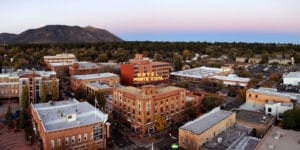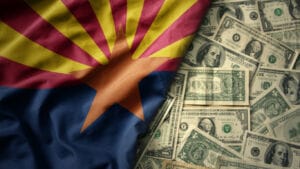Bank failures are in the headlines and that has raised questions for Arizona consumers. As a result, many of the state’s banks have drawn up their own plans of action to keep customers informed and confident.
“In a period of financial distress and instability, the more banks do to indicate the strength of their portfolios — the fact that they are not tainted by a lot of very risky debt, that the balance sheet does not have a lot of assets that are suspect — the better off they are going to appear,” says Herbert M. Kaufman, professor of finance at the W.P. Cary School of Business at Arizona State University. “It makes some sense for banks that are strong to emphasize that.”
In addition to other bank failures around the country, federal regulators closed First National Bank of Arizona in July, and Nevada-based Silver State Bank in early September. First National is now owned by Mutual of Omaha, and Silver State offices in Arizona reopened as National Bank of Arizona branches. In late September, federal regulators seized Seattle-based Washington Mutual and struck a deal to sell the savings and loan’s operations to J.P. Morgan Chase & Co. WaMu and Chase have branches in Arizona.
Consumer confidence in the country’s financial system has weakened, but Capitol Bancorp has not seen a strong response to Arizona bank failures, says John S. Lewis, the company’s president of bank performance. Capitol Bancorp has 10 community banks in Glendale, Mesa, Phoenix, Scottsdale, Tucson and Yuma.
“There is an underlying concern out there, but we’ve not seen any panic,” says Lewis, who is located in Phoenix.
Concerning the tumultuous first three weeks of September, Wells Fargo Bank’s Gerrit van Huisstede says some customers went to branches with questions about financial industry news.
“The recent news and developments have sparked considerable interest and concern from our customers. Some have asked about their investments, others about FDIC insurance and the safety of their deposits,” says Huisstede, regional president for Wells Fargo’s Desert Mountain Region encompassing Arizona, New Mexico and Nevada. “We’re working with each customer to provide the information that meets their individual needs.”
Banks have options to provide as much federal deposit insurance as possible, including the Certificate of Deposit Account Registry Service operated by Promontory Interfinancial Network in Arlington, Va. CDARS disperses deposits at participating banks into different individual CDs of up to $100,000 each, up to a maximum covered amount of $50 million.
Capitol Bancorp is educating its line employees on FDIC insurance and the status of their individual banks.
“The worst thing bank employees can do when asked if a customer’s deposits are insured is say, ‘I don’t know,’ ” Lewis says.
Wells Fargo builds confidence by “really getting to know our customers, then providing them with the right advice and financial products,” Huisstede says. The bank is reaching out to customers to tell them “they are working with one of the best capitalized large U.S. bank holding companies in the country.”
Education and information are the key to consumer confidence, says Tanya Wheeless, president and chief executive officer of the Arizona Bankers Association.
“Most of the community bankers are being proactive with their customers,” she adds. “Some send letters to customers providing information. For others, maybe it’s statement stuffers providing information. And they’re being available to answer questions. We’ve also seen all our banks put time into training their employees to answer customer questions.”
Meanwhile, Kaufman at ASU emphasizes that American banks are safe.
“The banking system is, right now, one of the stronger positions in the economy, especially the larger banks,” he says. “If anything, consumers are feeling positive about banks as compared to other alternatives.”
As it has responded to crisis situations in the nation’s financial system, the federal government has taken on a role of lender of last resort, and that should be comforting to bank customers, says Marshall Vest, an economist at the University of Arizona’s Eller College of Management.
“Not only does it insure your accounts at banks, the government also has stepped in to provide a backstop for money market mutual funds and it has taken extraordinary and unprecedented measures to fight off the freezing of credit markets,” Vest says. “That offers a great deal of comfort, knowing that the Federal Reserve and the Treasury are there doing their jobs. If they were doing nothing, then we would all be scrambling to pull money out of the bank. There’s no need for that.”



